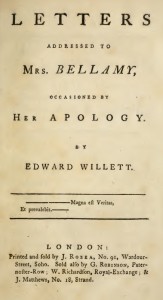“Edward Willett” isn’t a name you trip over everywhere you go, but it’s not exactly rare. Nor is it new: it crops up in genealogies and histories down through the past few centuries.
It’s true that these days if you Google “Edward Willett” (and doesn’t everyone?) the majority of the links will relate to me, but those other Edward Willetts crop up, too: including a fellow in the 18th century who wrote a book with the curious title of Letters Addressed to Mrs. Bellamy, Occasioned by her Apology.
I’ve been seeing this for years; last night I finally decided to find out what it was all about, and found myself fascinated, not just by the particulars of that little book, but by the ease with which I traced those particulars, and what that says about the amazing wealth of knowledge the Internet puts at our fingertips.
 My assumption had been that Letters Addressed to Mrs. Bellamy, Occasioned by her Apology would be some sort of genteel comic piece from one friend to another, the latter of whom had had some reason to offer an apology and the former of whom, through this little tract—it runs to only 75 pages and 10,000 words or thereabouts—gently pooh-poohed the very idea of an apology being required for whatever minor wrong had been done.
My assumption had been that Letters Addressed to Mrs. Bellamy, Occasioned by her Apology would be some sort of genteel comic piece from one friend to another, the latter of whom had had some reason to offer an apology and the former of whom, through this little tract—it runs to only 75 pages and 10,000 words or thereabouts—gently pooh-poohed the very idea of an apology being required for whatever minor wrong had been done.
Nothing could be further from the truth, as it turns out, for Letters Addressed to Mrs. Bellamy, Occasioned by her Apology is in fact a pretty acid response by a lawyer to a woman claiming he had cheated her out of money that should have come to her from the actor who had been living with her for ten years prior to his death.
Here are the particulars, as I have been able to determine them: and as I said, the very fact I was able to find these particulars, and in such detail, in so short a time, is a graphic demonstration of the power of the Internet, and the value of the (much-derided and questioned, alas) effort by Google and others to scan every book in every library, making their contents available to all of us with an Internet connection, not just those who have time and money and knowledge to present themselves physically within the confines of the library in question; and have you ever noticed (if I may make an aside) that when one reads books from the 18th century, one tends to adopt their style, which tends to both longer sentences and a great many more words (many of them much longer than those we gravitate toward today) than is the custom these many decades down the great stream of time?
Ahem.
 So. Before we get to Mr. Willett and Mrs. Bellamy, let me first introduce you to Harry Woodward (that’s him at left, dressed as Petruchio, in a painting by Benjamin van der Gucht). “One of the finest comedians of the eighteenth century,” according to the biography of him from the book English Actors: From Shakespeare to Macready (New York: Henry Holt and Co., 1879), as posted at Theatre Database. He made his debut at Covent Garden as a boy and had a long and successful career. That biography continues, “his face was of a serious cast; but the moment he opened his mouth upon the stage, a certain ludicrous air laid hold of his features, and every muscle ranged itself on the side of levity. The very tone of his voice inspired comic ideas…So naturally graceful was he, that it was said he could not throw himself into an ungraceful attitude.”
So. Before we get to Mr. Willett and Mrs. Bellamy, let me first introduce you to Harry Woodward (that’s him at left, dressed as Petruchio, in a painting by Benjamin van der Gucht). “One of the finest comedians of the eighteenth century,” according to the biography of him from the book English Actors: From Shakespeare to Macready (New York: Henry Holt and Co., 1879), as posted at Theatre Database. He made his debut at Covent Garden as a boy and had a long and successful career. That biography continues, “his face was of a serious cast; but the moment he opened his mouth upon the stage, a certain ludicrous air laid hold of his features, and every muscle ranged itself on the side of levity. The very tone of his voice inspired comic ideas…So naturally graceful was he, that it was said he could not throw himself into an ungraceful attitude.”
The Dictionary of National Biography, published in 1900, and archived for us of the Internet age by Oxford, adds: “Woodward has had few equals in comedy. His figure was admirably formed and his expression so composed that he seemed qualified rather for tragedy or fine gentlemen than the brisk fops and pert coxcombs he ordinarily played. He was unable…to speak a serious line with effect, but so soon as he had to charge his face with levity, and to display simulated consequence, brisk impertinence, or affected gaiety, he was the most engaging, consequential, and laughable of actors….” It also notes, however, that, “sometimes indeed he over-acted.” (Something I’ve never been accused of myself, but…hey, what’s that guffawing sound?)
At the very end of that biography comes this: “Mrs. Woodward predeceased her husband, and Woodward spent the last ten years of his life with George Anne Bellamy. To her he left the bulk of his estate, which, however, she never succeeded in obtaining.”
 And that brings us to the Mrs. Bellamy (yes, that’s her) whose Apology occasioned the letters of the man with whom I share a name.
And that brings us to the Mrs. Bellamy (yes, that’s her) whose Apology occasioned the letters of the man with whom I share a name.
According to the entry in the 1910 edition of Encyclopedia Britannica, which is posted at TheatreHistory.com, George Anne Bellamy (really intended to be Georgiana) claimed to have been born in 1733 but was actually probably born in 1727 (actresses!), in Fingal, Ireland, the illegitimate daughter of Lord Tyrawley, British ambassador at Lisbon. Lord Tyrawley, and good for him, acknowledged that she was his daughter, had her educated in a convent in Boulogne, and introduced her to a number of notable people in London, where she eventually became an actress.
Notes the encyclopedia, “Owing to her personal charms and the social patronage extended to her, her success was immediate, and till 1770 she acted in London, Edinburgh and Dublin, in all the principal tragic rôles. She played Juliet to Garrick’s Romeo at Drury Lane at the time that Spranger Barry was giving the rival performances at Covent Garden, and was considered the better of the Juliets.”
But, it concludes, “Her last years were unhappy, and passed in poverty and ill-health. She died on the 16th of February 1788. Her Apology (6 vols., 1785) gives an account of her long career and of her private life, the extravagance and licence of which were notorious.”
And now things began to make sense. The apology of Mrs. Bellamy which occasioned the publication of letters from Edward Willett was not an apology to Mr. Willett; it was an apology for her own life. (In six volumes, no less! She must have felt she had a lot to apologize for.)
Mrs. Bellamy clearly felt wronged by Mr. Willett (which she consistently misspelled Willet, leaving off the final T…alas, for us two-T Willetts, it seems some things never change), for she mentions him several times in her Apology (the full title of which is Apology for the Life of George Anne Bellamy, Late of Covent Graden Theatre, Written by Herself). The tone of those comments is…well, one good-sized passage will suffice:
“At the expiration of the time usually limited for executors to settle the affairs entrusted to their care, a trust of the most sacred and important nature, I waited on Mr. Woodward’s executors to know what had been done. When, to my inexpressible astonishment, I was informed, that there was no money for me, nor the least room for me to expect any. They added, that I must apply to Mr. Willet (sic), their attorney; as they were determined to be guided wholly by him, and being resolved not to act themselves, they had given their power up to him.
“Having met with this unexpected rebuff, I prevailed upon a friend of Mr. Woodward’s to call on Mr. Bromfield, but he would not hear what he had to say. I wrote repeatedly to him with as little effect, my letters being referred to Mr. Willet. At length driven by distress, I called at the house of the latter, where I was treated with an insolence I never before experienced.
“He informed me, that he had proceeded against Mr. Crawford till he had got execution against him. And upon my representing that the warrants to the bonds were in the hands of Mr. Burton of Dublin, he insolently replied, that indeed he would not cross the herring-pond. Upon my asking him when he thought I might expect any advantage, he told me, I had nothing to expect; that the executors had as good a right as myself to the effects if there were any; as I should squander it all away, supposing any advantages were to arise to me.
“It was in vain for me to remonstrate with a person who could have the effrontery to tell me this…”
And so forth and so on.
In the newspaper biz, there’s a saying that one should never argue with a man who buys ink by the barrel. Similarly, it’s never a good idea to insult a lawyer in public. Letters Addressed to Mrs. Bellamy, Occasioned by her Apology, was Edward Willett’s response, and the tenor of those letters is sharp, to say the least; Mrs. Bellamy, he says, despite her claims, has never been a close friend of “Mrs. Sincerity,” but is very well acquainted with “Mrs. Duplicity.”
At the very end of the little book, he writes, “You have brought your bosom friend, Mrs. Duplicity, to a public trial. You—even you, your own dear self—have turned evidence against her, by proving out of your wretched Apology, and with your own hand-writing, that she is a ‘Double Dealer,’ and an ‘Hypocrite;’ and, with the concurring testimony of true and faithful witnesses, she has also been proved ‘guilty of evil speaking, lying, and slandering.’—What remains but the SENTENCE!.
“When I took up my pen to address you, I had three objects in view.
“1st. To justify my own conduct.
“2nd. To present you with a mirror, wherein you may behold GEORGIANA BELLAMY, Spinster.
“3d. To exhibit you to the public, that you may be viewed in your true colours; not only where you now are, but long have been; ‘A far more capital actress in private life, than ever you were upon the public stage.’”
He notes the profits from the publication of his letters (priced at one shilling and sixpence) would be given to one of her favorite charities, The Lock Hospital, and ends with, “I take my leave of you in the words adopted by the governors of that Charity, as a motto, ‘Go, and sin no more.’
As we would say in this Internet age, “Ouch.”
This little pamphlet garnered considerable attention when it was printed, no doubt because Mrs. Bellamy had some fame as an actress. The Critical Review noted that “Mr. Willett in these Letters defends himself from the accusations brought against him by Mrs Bellamy in her fifth Volume with great reason and some humour. The description of the lady in some situations and her letters in others leave impressions very different from those produced by her Apology…”
On the other hand, the English Review said, “His defence of himself as a man of business is indeed highly satisfactory. But we can by no means approve the style of his letters. It is rudely and peevishly acrimonious. The sex of Mrs. Bellamy and her misfortunes ought to have protected her against many of his insinuations. Nor would he have defended himself with less advantage if he had abstained from them. A simple state of the business without any comment would have justified him as completely and would have conduced more to his honour. Mr Willett does not here appear as a professed author and indeed as a composer he had no claim to commendation.”
And again, “Ouch!”
So there you have it. A brief foray into the world of a previous Edward Willett. Like me, he also wrote for publication, albeit apparently only this one thing. Still, thanks to the printing press originally and now the Internet, this one thing has come down to us over nearly two and a half centuries, keeping alive, in some small ways, the personalities of a long-gone age.
It makes one wonder if the things we write today, in pixels or in print, will likewise carry our name into the future.
If so, it is perhaps best that we all be friends with Mrs. Sincerity rather than Mrs. Duplicity, less SENTENCE! be passed on us all.








2 comments
Hello, I too have been reading a lot of eighteenth century writing by or about actresses. I remember reading that a benefit performance was given for Mrs. Bellamy as she was in such a bad way financially. It is all so fascinating, have you taken a course with the gentle blogger in Spitalfields?
No, I don’t know who the “gentle blogger in Spitalfields” is. 🙂 I came to the story because of the shared name.